- Home
- Iain M. Banks
Matter Page 8
Matter Read online
Page 8
She put one gloved hand to the goggles, pulling them away from her face a fraction to let a little moisture out from the base of the frames. The sparse liquid ran down her cheeks, leaving streaks, but soon dried in the dusty force of air. She took a deep breath through the protecting scarf as the clouds of dust parted like a dry mist, allowing her an uninterrupted view of the distant city and the forces that had been besieging it.
The city was burning. Siege engines taller than its own towers buttressed its walls like gigantic calipers. The desert around it, until recently dark with the besieging army, was clearing as they poured into the stricken city, exposing sand the colour of drying blood. Smoke tried to rise from the wreckage of the shattered buildings in great curling bundles of darkness but was struck down by the force of the gale, flattened and whirled away from the various conflagrations, dipping down and back towards the desert to come rearing up again as it met the cliff so that it went billowing over Anaplian’s head in a ragged, fast-moving overcast.
The wind increased in strength. Out over the plain, a wall of dust was forming between her and the city as half the desert seemed to lift into the air, gradually dimming and wiping away the view, silhouetting a series of rocky outcrops for a few moments until they too were swept under the hem of the advancing dust storm. She turned and walked a little way back to where a contraption like a cross between a skeleton and a sculpture sat poised on all fours on the exposed rock. She gathered the coat about her and stepped backwards on to the feet of the strange machine. The seatrider came alive instantly, swinging up fluidly and fitting itself about her, clasps closing round ankles, thighs, waist, neck and upper arms, nestling its thin form around her like a lover. She took the offered control grip as it swung out to her hand and pulled it upwards, sending the machine and her flying into the sky, then pushed forward so that she went racing through the storm of dust and smoke to the beleaguered city.
She rose through the haze into clearer air as she built up speed, leaving the fields down at first and letting the slipstream buffet her, the wind making her coat tails snap like whips and forcing the hat’s brim to fold itself away, then she clicked the streamline field on and rode in a delta-shaped bubble of quiet air towards the city.
She dropped and slowed as she crossed over the walls and turned the streamline field off again. She flew between wind-twisted columns of smoke, watching the besieging forces as they swept into the spaces of the city, saw defenders falling back and inhabitants fleeing, observed arrows fly and a last few rocks and fire barrels land in the city’s upper reaches. She smelled the smoke and heard the clash of blades and the crack and rattle of burning and the rumble of falling masonry and the ululating battle cries and war trumpets of the victorious invaders and the wails and screams of the defeated. She saw a few tiny figures pointing at her, and a couple of arrows arced towards her then fell away again. She was knocked to one side and almost thought herself hit with the violence of the action as the seatrider dodged a fire barrel; it went past with a great roar and a stench of burning oil, looping downwards to crash into the roof of a temple in the upper city, splashing flame.
She turned the full panoply of fields back on, hiding her and the machine and enclosing herself in the still bubble of protected air again. She had been heading for the centre of the city, for what she assumed would be the citadel and the palace, but then changed her mind and flew around one side of the city, level with its middle reaches, watching the general influx of invaders and the chaotic retreat of defenders and civilians while also trying to observe the slighter struggles of small groups and individuals.
Eventually she alighted on the flat, low-walled roof of a modest building where a rape was in progress and a small child cowered in a corner. The four soldiers waiting their turn gazed at her with annoyance when she appeared seemingly from thin air, stepping off the seatrider. Their frowns were beginning to turn into appreciative if unpleasant smiles when she drew a sleek chunk of a gun from a shoulder holster and, smiling thinly back, set about punching head-sized holes in each of their torsos. The first three men went flying backwards off the roof to the street below in frothy detonations of blood and tissue. The fourth man had time to react and – as he ducked and started to dive away – a tiny part of Anaplian’s combat wiring kicked in, flicking the gun more quickly than her conscious mind could have ordered the action and simultaneously communicating with the weapon itself to adjust its emission pattern and beam-spread. The fourth soldier erupted across the roof in a long slithering torrent of guts. A sort of bubbling gasp escaped his lips as he died.
The man raping the woman was looking up at Anaplian, mouth open. She walked round a few paces to get a clear shot at him without endangering the woman, then blew his head off. She glanced at the child, who was staring at the dead soldier and the form lying underneath the spasming, blood-spouting body. She made what she hoped was a calming motion with her hand. “Just wait,” she said in what ought to be the child’s own language. She kicked the soldier’s body off the woman, but she was already dead. They’d stuffed a rag into her mouth, perhaps to stop her screams, and she had choked on it.
Djan Seriy Anaplian let her head down for a moment, and cursed quickly in a selection of languages, at least one of which had its home many thousands of light years away, then turned back to the child. It was a boy. His eyes were wide and his dirty face was streaked with tears. He was naked except for a cloth and she wondered if he had been due to be next, or just marked to be thrown from the roof. Maybe they’d have left him. Maybe they hadn’t meant to kill the woman.
She felt she ought to be shaking. Doubtless without the combat wiring she would be. She glanded quickcalm to take the edge off the internal shock.
She put the gun away – though even now the boy probably didn’t understand it was a weapon – and walked over to him, crouching down and hunkering as she got up close to him. She tried to look friendly and encouraging, but did not know what to say. The sound of running footsteps rang from the open stairwell on the opposite corner of the roof.
She lifted the boy by both armpits. He didn’t struggle, though he tried to keep his legs up and his arms round his knees, retaining the ball shape she’d first seen him in. He was very light and smelled of sweat and urine. She turned him round and held him to her chest as she stepped into the seatrider. It closed around her again, offering the control grip as its sliding, clicking components fastened her and it together.
A soldier wielding a crossbow arrived clattering at the top of the steps. She took the gun out and pointed it at him as he took aim at her, but then shook her head, breathed, “Oh, just fuck off,” flicked the controls and zoomed into the air, still holding the child. The bolt made a thunking noise as it skittered off the machine’s lower field enclosure.
“And what exactly do you intend to do with it?” the drone Turminder Xuss asked. They were on a tall stump of rock at least as far downwind from Anaplian’s earlier clifftop vantage point as that had been from the city. The child – he was called Toark – had been told not to go near the edge of the great rock column, but was anyway being watched by a scout missile. Turminder Xuss had, in addition, given the boy its oldest and least capable knife missile to play with because the weapon was articulated; its stubby sections snicked and turned in the child’s hands. He was making delighted, cooing noises. So far, the knife missile had suffered this treatment without complaint.
“I have no idea,” Anaplian admitted.
“Release him into the wild?” the drone suggested. “Send him back to the city?”
“No,” Anaplian said, sighing. “He keeps asking when Mummy’s going to wake up,” she added, voice barely above a whisper.
“You have introduced a Special Circumstances apprenticeship scheme on your own initiative,” the drone suggested.
Anaplian ignored this. “We’ll look for somewhere safe to leave him, find a family that can raise him,” she told the machine. She was sitting on her haunches, her coat spread around her
.
“You should have left him where he was,” the drone said above the still strong wind, lowering the tone of its voice and slowing its delivery as it tried to sound reasonable rather than sarcastic.
“I know. That didn’t feel like an option at the time.”
“Your seatrider tells me you – how shall I put this? – appeared to the attackers and defenders of the city like some demented if largely ineffectual angel before you swooped in and carried little Toark away.”
Anaplian glared at the seatrider, not that the obedient but utterly unintelligent machine would have had any choice but to surrender its memories to the drone when it had been asked.
“What are you doing here, anyway?” she asked Xuss.
She’d asked to be left alone for the day to watch the fall of the city. It had been her fault, after all; it had come about due to actions she had taken and indeed helped plan, and though it was by no means what had been desired, its sacking represented a risk that she, amongst others, had judged worth taking. It was demonstrably not the worst that might have happened, but it was still an abomination, an atrocity, and she had had a hand in it. That had been enough for her to feel that she could not just ignore it, that she needed to bear witness to such horror. The next time – if there was a next time, if she wasn’t thrown out for her irrational, overly sentimental actions – she would weigh the potential for massacre a deal more heavily.
“We have been summoned,” the machine said. “We need to get to the Quonber; Jerle Batra awaits.” Its fields flashed a frosty blue. “I brought the module.”
Anaplian looked confused. “That was quick.”
“Not to slap your wrist for disturbing the war or rescuing adorable waifs. The summons pre-dates such eccentricities.”
“Batra wants to see me personally?” Anaplian frowned.
“I know. Not like him.” It dipped left-right in its equivalent of a shrug. “It.”
Anaplian rose, dusting her hands. “Let’s go then.” She called to the boy, who was still trying to twist the uncomplaining knife missile apart. The module shimmered into view at the cliff edge.
“Do you know what his name means?” the drone asked as the child came walking shyly towards them.
“No,” the woman said. She lifted her head a little. She thought she’d caught a hint of the smell of distant burning.
“‘Toark’,” the drone said as the boy came up to them, politely handing back the knife missile. “In what they call the Old Tongue—”
“Lady, when does my mother wake?” the boy asked.
Anaplian gave what she was sure was a not particularly convincing smile. “I can’t tell you,” she admitted. She held out one hand to guide the child into the module’s softly gleaming interior.
“It means ‘Lucky’,” the drone finished.
The module trajectoried itself from the warm winds of the desert through thinning gases into space, then fell back into the atmosphere half a world away before Toark had finished marvelling at how clean he had become, and how quickly. Anaplian had told him to stand still, close his eyes and ignore any tickling sensation, then plonked a blob of cleaner gel on his head. It torused down over him, unrolling like liquid and making him squirm when a couple of smaller circles formed round his fingers and rolled back up to his armpits and back down. She’d cleaned his little loincloth with another blob but he wanted that gone and chose a sort of baggy shirt from a holo-display instead. He was most impressed when this immediately popped out of a drawer.
Meanwhile the woman and the drone argued about the degree of eye-averting that ought to be applied to her rule-breaking flight over the city. She was not quite yet at the level where the Minds that oversaw this sort of mission just gave her an objective and let her get on with it. She was still in the last stages of training and so her behaviour was more managed, her strategy and tactics more circumscribed and her initiative given less free rein than that of the most experienced and skilled practitioners of that ultimately dark art of always well-meaning, sometimes risky and just occasionally catastrophic interference in the affairs of other civilisations.
They agreed the drone wouldn’t volunteer any information or opinion. It would all come out in the end – everything came out in the end – but by then, hopefully, it wouldn’t seem so important. Part of the training of a Special Circumstances agent was learning a) that the rules were supposed to be broken sometimes, b) just how to go about breaking the rules, and c) how to get away with it, whether the rule-breaking had led to a successful outcome or not.
They landed on the platform Quonber, a flat slab of hangar space and accommodation units that looked like a small, squashed cruise liner, albeit one perfectly disguised by a camoufield. It floated smoothly in the warm air just over the altitude where a few puffy clouds drifted, their shadows spotting the surface of the pale green ocean a couple of thousand metres below. Directly beneath the platform lay the salt lagoons of an uninhabited island near the planet’s equator.
The platform was home to another eleven SC human staff, all charged with attempting to alter the development of the various species on Prasadal. The planet was unusual in having five quite different sentient expansionist/aggressive species all hitting their civilisational stride at the same time. In all recorded history, every other time this had happened without some outside influence taking a hand in matters, at least three and usually four of the contending species were simply destroyed by the victorious grouping. The Culture’s notoriously highly detailed and allegedly extremely reliable simulations confirmed that this was just the way things worked out for your average aggressive species, unless you interfered.
When the module arrived everybody else was either on the ground or busy, so they saw nobody else as one of the Quonber’s own slaved drones escorted them along the open side-deck towards the rear of the platform. Toark stared goggle-eyed through the drop of air towards the salt lagoons far below.
“Shouldn’t you at least hide the boy?” the drone suggested.
“What would be the point?” Anaplian asked it.
The slave-drone showed them into the presence of Anaplian’s control and mentor, Jerle Batra, who was taking the air on the wide balcony that curved round the rear portion of the module’s third deck.
Jerle Batra had been born male. He had, as was common in the Culture, changed sex a while, and had borne a child. Later, for his own reasons, he had spent some time in Storage, passing a dreamless millennium and more in the closest thing the Culture knew to death from which it was still possible to wake.
And when he had awoken, and still felt the pain of being a human in human form, he had had his brain and central nervous system transferred sequentially into a variety of different forms, ending, for now at least, with the body type he now inhabited and which he had retained for the last hundred years or so – certainly for the decade or more that Anaplian had known him, that of an Aciculate; his shape was bush-like.
His still human brain, plus its accompanying biological but non-human support systems, was housed in a small central pod from which sixteen thick limbs protruded; these quickly branched and rebranched to form smaller and smaller limblets, maniples and sensor stalks, the most delicate of which were hair-thin. In his normal, everyday state he looked just like a small, rootless, spherical bush made from tubes and wires. Compressed, he was little larger than the helmet of an old-fashioned human spacesuit. Fully extended, he could stretch for twenty metres in any given direction, which gave him what he liked to term a high contortionality factor. He had, in all his forms, always worshipped order, efficiency and fitness, and in the Aciculate form felt he had found something that epitomised such values.
Aciculacy was not the furthest one could stray from what the Culture regarded as human basic. Other ex-humans who looked superficially a lot like Jerle Batra had had their entire consciousness transcribed from the biological substrate that was their brain into a purely non-biological form, so that, usually, an Aciculate of that type woul
d have its intelligence and being distributed throughout its physical structure rather than having a central hub. Their contortionality factor could be off the scale compared to Batra’s.
Other people had assumed the shapes of almost anything mobile imaginable, from the relatively ordinary (fish, birds, other oxygen-breathing animals) to the more exotic, via alien life-forms – again, including those which were not normally in the habit of supporting a conscious mind – all the way to the truly unusual, such as taking the form of the cooling and circulatory fluid within a Tueriellian Maieutic seed-sail, or the spore-wisp of a stellar field-liner. These last two, though, were both extreme and one-way; there was a whole category of Amendations that were hard to do and impossible to undo. Nothing sanely transcribable had ever been shifted back from something resembling a stellar field-liner into a human brain.
A few genuine eccentrics had even taken the form of drones and knife missiles, though this was generally considered to be somewhat insulting to both machine- and human-kind.
“Djan Seriy Anaplian,” Batra said in a very human-sounding voice. “Good day. Oh. Do I congratulate?”

 Use of Weapons
Use of Weapons Transition
Transition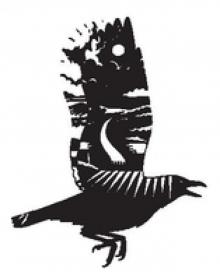 The Crow Road
The Crow Road Feersum Endjinn
Feersum Endjinn Matter
Matter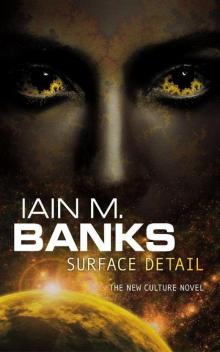 Surface Detail
Surface Detail The Wasp Factory
The Wasp Factory Consider Phlebas
Consider Phlebas Against a Dark Background
Against a Dark Background Excession
Excession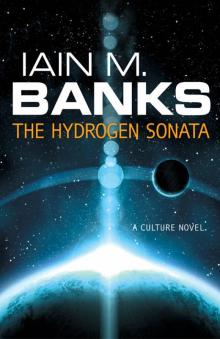 The Hydrogen Sonata
The Hydrogen Sonata The Algebraist
The Algebraist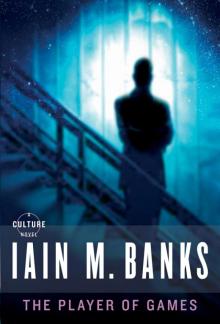 The Player of Games
The Player of Games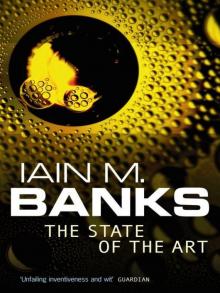 The State of the Art
The State of the Art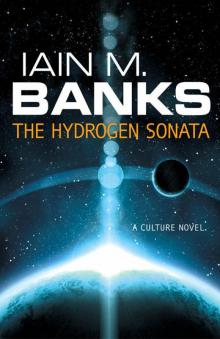 The Hydrogen Sonata c-10
The Hydrogen Sonata c-10 Excession c-5
Excession c-5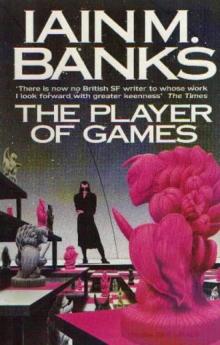 The Player of Games c-2
The Player of Games c-2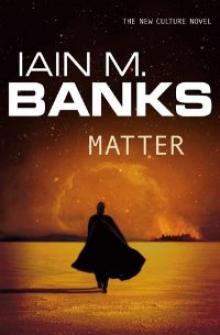 Matter c-8
Matter c-8 The State of The Art c-4
The State of The Art c-4 Look to Windward c-7
Look to Windward c-7 Consider Phlebas c-1
Consider Phlebas c-1